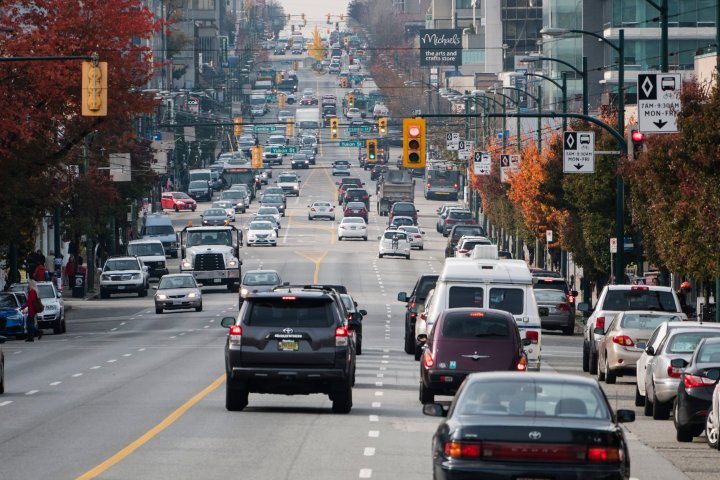
A controversial proposal for city-wide residential parking permits as a part of Vancouver’s climate action plan failed Wednesday night, with Mayor Kennedy Stewart casting the deciding vote.
In a statement issued immediately after the vote, Stewart said he voted against the proposal because he felt it would unfairly affect lower-income residents.
“It would have asked those renting basement suites or working in vehicle-dependent jobs to pay more while asking homeowners with private parking to pay nothing,” Stewart said.
“An effective climate plan must be just. I’ve asked staff to find a better way forward and I am confident they will.”

The proposal essentially split council down party lines. The five other votes in opposition all came from councillors elected in the 2018 election under the Non-Partisan Association banner (the majority of whom have since left the party).
Council’s Green, COPE and One City members voted to back the plan.
“The very real cost will be born by our residents in an already unaffordable city,” Coun. Colleen Hardwick said in casting her no vote.
“What this means is taking more money out of the pockets of our residents pure and simple.”
Green councillor Adrianne Carr became visibly emotional as she expressed disappointment in the motion failing.
“What will affect families? Climate change, more than anything that you can imagine. What will be a financial burden? Climate change more than anything you can possibly imagine.”
“It’s not our branding that’s at stake or at risk, its our planet, its our future, its our children’s future. It’s not about choosing the best approach, it’s about taking every possible action we can to reduce our greenhouse gas emissions.”
Fellow Green Pete Fry said the defeat showed that some councillors were prepared to talk about climate action, but “the literal putting our money where our mouth is just isn’t there.”

The decision came after a marathon of presentations and public speakers, with a clear split in public opinion on the proposal.
Some speakers called the program a cash grab, while others said it would let people with private parking off the hook. Supporters argued it would cement the city as a climate leader, and said car owners were currently getting a subsidy in the form of free parking from the city.
If approved, the program would have applied a $45 annual parking fee for residents who parked their vehicles on the street between midnight and 7 a.m. Low-income residents would have been able to apply for a fee reduction to $5 per year.
It also would have included a $1,000 pollution charge for certain new luxury or high-emission vehicles purchased after 2023.
The parking permit program was to have been a component of the city’s Climate Emergency Action Plan, which seeks to reduce Vancouver’s carbon footprint by 50 per cent by 2030.

The permits were presented as incentivizing residents to choose lower-emission vehicles while simultaneously funding some of the plan’s other goals.
Staff had estimated the permit system would have generated up to $68 million in each of the first four years.
Without revenue generated by the permits, the Climate Emergency Action Plan will need to rely on money from senior levels of government, increased property taxes or money reallocated from other parts of the city’s budget.
— with files form Elizabeth McSheffrey
© 2021 Global News, a division of Corus Entertainment Inc.
